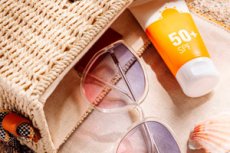Nye publikasjoner
Solkrem forstyrrer ikke produksjonen av D-vitamin
Sist anmeldt: 02.07.2025

Alt iLive-innhold blir gjennomgått med medisin eller faktisk kontrollert for å sikre så mye faktuell nøyaktighet som mulig.
Vi har strenge retningslinjer for innkjøp og kun kobling til anerkjente medieområder, akademiske forskningsinstitusjoner og, når det er mulig, medisinsk peer-evaluerte studier. Merk at tallene i parenteser ([1], [2], etc.) er klikkbare koblinger til disse studiene.
Hvis du føler at noe av innholdet vårt er unøyaktig, utdatert eller ellers tvilsomt, velg det og trykk Ctrl + Enter.

Nok en gang har det blusset opp en debatt på sosiale medier, denne gangen om bruk av solkrem. Krangelen startet da Tim Spector, professor i genetisk epidemiologi ved King's College London, uttrykte bekymring for at daglig bruk av solkrem kunne føre til vitamin D-mangel.
Selv om Spectors innlegg har skapt en del oppstyr, er det ikke første gang lignende argumenter mot solkrem har dukket opp på sosiale medier – det finnes mange innlegg som diskuterer problemet. De fleste av disse bekymringene dreier seg om det faktum at solkrem blokkerer ultrafiolett (UV) stråling, som er nødvendig for å syntetisere vitamin D i huden. Heldigvis tyder forskning på at dette sannsynligvis ikke er et problem for folk flest.
Vitamin D er et essensielt næringsstoff. Det bidrar til å regulere kalsiumopptaket, noe som er viktig for beinhelsen. En økende mengde forskning tyder også på at vitamin D kan være viktig for andre aspekter ved helsen, inkludert å styrke immunforsvaret, redusere betennelse og opprettholde hjertehelsen. Imidlertid er det behov for mer forskning for å bekrefte disse funnene.
Selv om vi kan få vitamin D fra visse matvarer, som fet fisk, eggeplommer og berikede meieriprodukter, er kroppen vår hovedsakelig avhengig av sollys for å produsere det i huden.
Når vi blir utsatt for ultrafiolett B (UVB)-stråling, skjer det en rekke prosesser i hudcellene våre som omdanner et kolesterollignende molekyl til vitamin D3.
Siden produksjon av vitamin D krever eksponering for UVB-stråling, er det rimelig å anta at bruk av solkrem forstyrrer vitamin D-syntesen.
Solkrem fungerer som et filter som absorberer eller reflekterer solens UV-stråling. Jo høyere solfaktor (SPF) et produkt har, desto bedre beskytter det mot solbrenthet (hovedsakelig forårsaket av UVB-stråling). Ved å forhindre at denne strålingen når og muterer DNA i hudceller, kan solkremer redusere risikoen for hudkreft. Solkremer har også vist seg å redusere UV-strålingsindusert aldring av huden.
Solkremer gir imidlertid ikke 100 % beskyttelse, hovedsakelig fordi folk flest ikke bruker dem som anvist. Folk bruker vanligvis bare omtrent en fjerdedel til en tredjedel av mengden solkrem som trengs, og bruker den sjelden på nytt som anvist. Dette betyr at noe UVB fortsatt når hudoverflaten.
Solkrem og vitamin D
Mange studier har sett på effekten av bruk av solkrem på vitamin D-nivåer. Samlet sett viser resultatene at solkrem fortsatt lar deg produsere tilstrekkelige mengder vitamin D ved vanlig bruk.
I en studie utført av forskerteamet vårt, gjennomførte vi et ukelangt eksperiment på 40 ferierende på Tenerife i Spania. Deltakerne ble lært hvordan de skulle bruke solkrem med SPF 15 på riktig måte for å beskytte huden sin.
Solkrem beskyttet ikke bare deltakerne mot solbrenthet, den forbedret også vitamin D-nivåene deres. Dette viste at selv med solkrem når nok UVB-stråling fortsatt huden til å produsere vitamin D.
Disse funnene stemmer overens med to oversikter som også så på bruk av solkrem og vitamin D-nivåer i den virkelige verden.
De fleste studiene som ble inkludert i disse oversiktene rapporterte enten at bruk av solkrem ikke påvirket vitamin D-nivåene, eller at bruken resulterte i økte vitamin D-nivåer. Dette gjaldt spesielt for feltstudier, som best gjenspeilet bruk av solkrem og soleksponering i virkelige omgivelser.
Disse oversiktene fant imidlertid også flere eksperimentelle studier (med mer kontrollerte forhold) som viste at bruk av solkrem kan forhindre syntese av vitamin D. Disse studiene brukte imidlertid UV-kilder som ikke er representative for solens UV-stråling, noe som kan begrense deres relevans for funn i den virkelige verden.
En annen begrensning ved studiene som ble gjennomgått i disse oversiktene var at de fleste brukte solkremer med lav SPF (rundt SPF 15 eller lavere). Folkehelseanbefalinger foreslår bruk av solkrem med en SPF på minst 30, noe som potensielt kan ha en sterkere hemmende effekt på vitamin D-produksjonen.
Og de fleste av disse studiene inkluderte kun hvite deltakere. Hvit hud inneholder mindre melanin, som fungerer som en naturlig solkrem og beskytter mot UV-skader (inkludert solbrenthet).
Melanin kan også ha en liten hemmende effekt på vitamin D-produksjonen. Observasjonsstudier viser konsekvent at mørkhudede personer har en tendens til å ha lavere vitamin D-nivåer enn lyshudede personer som bor på samme breddegrad. Denne forskjellen blir enda mer uttalt på høyere breddegrader, der UVB-strålingsnivåene er lavere.
En gjennomgang fant også at personer med lysere hudtyper produserer mer vitamin D. Denne forskjellen skyldes imidlertid sannsynligvis forskjeller i metodikken til studiene som er inkludert i gjennomgangen. Noen brukte kunstige lyskilder som ikke representerer solens UV-stråling og kan gi urepresentative resultater.
Mer forskning er nødvendig, inkludert personer med mørkere hudtyper og bruker solkremer med høyere SPF. Men basert på tilgjengelige data påvirker ikke vanlig bruk av solkrem vitamin D-produksjonen. Den har også den ekstra fordelen at den forhindrer skadelig UV-stråling.
Gitt at personer med mørkere hud har høyere risiko for vitamin D-mangel, kan det være gunstig å tilbringe mer tid i solen. Men selv om personer med mørkere hud har 20 til 60 ganger lavere risiko for hudkreft enn personer med lysere hud, er det fortsatt viktig å unngå solen når den er sterkest og å bruke solkrem eller dekke seg til hvis du er utendørs på solfylte dager.
